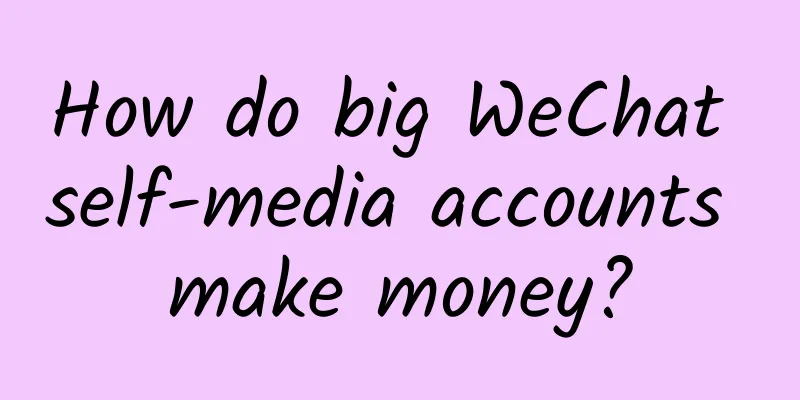How do big WeChat self-media accounts make money?

|
Although Zhang Xiaolong, the "Father of WeChat", admitted last week that he "doesn't know how WeChat makes money", this does not prevent more and more WeChat users from trying to do something through WeChat public accounts. Currently, there are about 400 million monthly active WeChat users (active standard: at least one WeChat message with friends and at least one Moments per month), and the total number of WeChat public accounts has exceeded 8 million, and is still growing at a rate of 15,000 per day. In other words, on average, one out of every 50 active WeChat users is providing content for other friends. There is no such thing as no gain. Behind such high enthusiasm, in addition to expressing oneself, there is also the pursuit of interests. But can you really make money by running a WeChat public account? What are the operating methods? This afternoon, the New Media Rankings convened a group of typical self-media accounts to discuss the issue of "how to make money from self-media". Let's listen to Hu Gu, who was in the audience, slowly tell us the practical stuff. Let me first introduce the guests on stage. From left to right in the picture above are: Zhang Lifen (host), editor-in-chief of FT Chinese website, Wang Kai, former CCTV host, Qin Chao, founder of "Restaurant Boss Insider", Ayawawa, emotional expert and Taobao shop owner, Feng Hao, operator of "God Notes", Huang Zhangjin, founder of "Elephant Guild", and Xin Haiguang, former media person. "Wang Kai tells stories": It is easiest to earn money from children Among these people, the bald Wang Kai may be the one you are most familiar with. Born with a deep voice, he used to work on CCTV2's "Financial Stories" column. After leaving CCTV last year, Wang Kai began to tell stories specifically for children. Currently, his public account "Uncle Kai Tells Stories" has 300,000 fans and has good revenue, so Wang Kai's state in the conversation is also very good, often looking around and interrupting. Regarding the issue of making money on WeChat, Wang Kai believes: First, don't sell advertisements. There are more and more public accounts, the market of self-media is becoming more and more segmented, and users' attention is becoming more and more dispersed, so you can't make money by relying on advertisements, and it will also affect the user experience; second, don't charge for content, because this is contrary to the original intention of information dissemination. Charging will erect a wall around your content dissemination field. Wang Kai's own way of making money is as follows: 1. The stories he tells are divided into two types: free and paid. Children are hooked by the free ones and naturally clamor to listen to the paid ones. That's how the money comes in. This year, Wang Kai sold more than 7,000 copies of the full version of "Journey to the West", earning more than one million yuan. This is the reason. Second, build a community. There are many families who love to listen to stories. Attract them to the WeChat group you run. Once there is a commercial need, it is not a problem to attract people to organize activities or crowdfunding. This is actually the same principle as "Luoji Siwei". "Insider Guide for Restaurant Owners": A plan sells for 15,000 Qin Chao is the operator of "Restaurant Boss Insider", which currently has about 100,000 fans. At the beginning of his business, Qin Chao wanted to do self-media in the field of food, but this group is relatively large and the group's monetization ability is poor, so he finally chose the niche market of restaurant owners - 30% of the people who follow his public account are restaurant owners, 30% are restaurant food suppliers and equipment providers, and the rest are people who are interested in or are engaged in the catering industry. The team of "Restaurant Boss Insider" currently has 11 people, and the main way to make money is planning and consulting, and occasionally some advertising. Qin Chao said that now he helps his boss fans with marketing planning or new media consulting for a unit price of 15,000 yuan, and he earns about 100,000 yuan a month, and his life is not bad. He believes that for WeChat public accounts, "who reads it" is more valuable than "how many people read it". “Ayawawa”: divert traffic to a famous Taobao store Ayawawa, whose real name is Yang Bingyang, is the only female guest on stage. As an Internet celebrity who got her start on Mop and Tianya Forum in 2001, Ayawawa has been active for an incredibly long time. This is certainly due to her good looks, but it is also inseparable from her constant repositioning of herself over the years. From an Internet community beauty to an emotional expert, and then to the head of the high IQ club Mensa, Ayawawa has released her intelligence and charm through various channels such as publishing books, appearing on TV, and operating Weibo and WeChat. So how did such a smart woman monetize her WeChat public account with 400,000 followers? Advertising is of course part of it. Ayawawa admitted that the advertising rate for her public account ranges from 30,000 to 50,000 yuan, but she doesn't usually take many jobs, with a cooperation rate of only about 10%. The main way to realize money is through her own Taobao store. According to Ayawawa, her store ranked 50th in the beauty category of Taobao on Double 12 this year, and ranked first among Taobao stores opened by self-media people who rely purely on external traffic. I believe everyone is aware of the profits of beauty e-commerce. I believe that Ayawawa's team will receive a relatively good year-end bonus this year, but of course it is indeed quite hard work. As an emotional expert, Ayawawa usually helps others answer emotional questions in her public account. The main process is: the assistant dictates, she selects, and answers ten questions every day. The problem that she is worried about is: how to filter out the audience who are willing to consume from the hundreds of thousands of fans who are just watching the fun. "God Notes": With more than 30 grassroots accounts, you don't have to worry about not getting advertising To be honest, Hu Gu had never paid attention to the account "Shenjibi" before. According to its founder Feng Hao, this public account is biased towards grassroots groups, and the content is mainly about health, travel, and comedy, with hundreds of thousands of fans. Its profit model is also very simple: 1. Post soft-text advertisements; 2. Cooperate with various advertising alliances. These are all conventional routines, and I will not repeat them here. The more interesting person is Feng Hao. He was a Huawei engineer before. Last year, he made a lot of noise because of the "blasting the president" incident (if you are interested, you can Baidu "Huawei engineer blasts the president on Weibo"). After leaving Huawei, he and his wife started their own media journey. It is said that the two of them operate more than 30 WeChat public accounts in total... Fortunately, they are all grassroots entertainment, mainly focusing on content integration, so they don't need to involve too much energy. "Elephant Guild": Seeking sponsorship from wealthy people Huang Zhangjin is a former media person whom Hu Gua particularly wants to meet. After leaving Phoenix Weekly, he founded the awesome "Elephant Association" - the overall quality of the articles is so high that it ranks among the top three domestic self-media, and some of the articles are even on par with the cover articles of first-class magazines. With such awesome content, he must not have to worry about making money, right? In fact, this is what Huang Zhangjin is most worried about. At present, the WeChat account of the Elephant Association has 300,000 followers, which is not a lot, but not a small number. The key point is: Huang Zhangjin believes that he is not a self-media, "I just want to create content myself, I don't want to do too much fancy marketing, if I can have a publication number or something, I really can publish a magazine." He also said: "I don't have the heart to take orders, it would be best if there are stable brand advertisers who come to me." - What do you think is the difference between this and traditional media? Elephant is not profitable at present, and its monthly cost is about 100,000 yuan. Fortunately, it has received investment before, "it can still burn money for a year." I heard that writing articles for Elephant is very tiring, and the work intensity per unit time is much higher than that in traditional media. Hu Gu sincerely hopes that in the next year, Elephant can get new financing, so that the Elephant team can use their late nights to write articles and not worry about survival. "Xin Haiguang": self-sufficiency and freedom Xin Haiguang is a self-media person that Hu Gu is familiar with because they are both in the technology media circle. He came from the official media and started writing articles online in 1999. He has maintained a strong desire to express himself over the years. Currently, Xin Haiguang operates two WeChat accounts: "Xin Haiguang Weitianxia", which mainly focuses on original comments in the fields of technology and industry and economy, with 100,000 followers; "Zhengshang Neican", which mainly reprints articles in the fields of finance and current affairs, with 500,000 followers. (The technology field is so niche, Hu Gu is about to cry) In terms of profit model, Xin Haiguang is a typical self-sufficient type. Currently, he operates these two accounts by himself, so there is no cost. The income from Guangdiantong and soft articles is enough for Lao Xin to have food and clothing without having to work. Compared with the self-media with a team of more than a dozen people, Xin Haiguang's "self" attribute is more pure: he writes when he has material, reposts when he sees it, and takes on jobs when he has them. He does not have higher requirements for fans, does not have too many expectations for himself, is free and unfettered, and refuses pressure. Of course, he can be so free because his more than ten years of media career have shaped his vision, writing style, connections, and standards. This is a threshold, can ordinary people like you cross it? From the stories of the above six big Vs, Hu Gua summarized several insights: 1. Advertisements are definitely necessary. Even a little money is still money. 2. Diverting traffic to do e-commerce, which does not rely on content to make money, is the most efficient monetization model, but the threshold is high and requires the refined operation of a professional team; 3. The community gameplay seems perfect, but it requires a core star-like figure, and few people have such strong personal charm; 4. Find out who your fans are? Who are your core fans? Who are your die-hard fans who are willing to give you rewards? 5. Without six-digit fans, any business model is fake; As a winner of Toutiao's Qingyun Plan and Baijiahao's Bai+ Plan, the 2019 Baidu Digital Author of the Year, the Baijiahao's Most Popular Author in the Technology Field, the 2019 Sogou Technology and Culture Author, and the 2021 Baijiahao Quarterly Influential Creator, he has won many awards, including the 2013 Sohu Best Industry Media Person, the 2015 China New Media Entrepreneurship Competition Beijing Third Place, the 2015 Guangmang Experience Award, the 2015 China New Media Entrepreneurship Competition Finals Third Place, and the 2018 Baidu Dynamic Annual Powerful Celebrity. |
<<: Lei Jun's interview with the audience: Xiaomi's boundaries, vision and challenges
>>: Have you been fooled by wearable devices?
Recommend
Billion-dollar gambling debt default: Dong Mingzhu "marketed" Lei Jun
At the end of 2013, at the CCTV Economic Person o...
For online operation and promotion, can the hit H5 that goes viral be replicated?
In the past two years, we have seen H5s produced ...
How to leverage Moments ads to attract new users?
This article takes a decoration company as an exa...
LeEco receives 16.8 billion yuan in strategic investment to revive its business and is expected to surpass BAT and lead the Internet industry
"There will always be a time to ride the win...
Apple iOS 15 official version WeChat voice "press and hold to speak" has a delay
IT Home reported on October 12 that the official ...
Butter rice cake is very popular, but not everyone can eat it——
Review expert: Wang Xiaohui, deputy senior engine...
The complete collection of The Legend of the Dragon Slayer comics is free: How to make the website HTML code more in line with the SEO structure?
The web pages that ordinary people see are organi...
If the universe is a "dark forest", why do we go to so much trouble to look for aliens?
Text|Li Yuebai and Jiang Xiaoyuan Recently, news ...
Identification of popular food: milk tea condiments!
Image source: Qiantu.com 1. Tapioca pearls: to pu...
Case review | Difference in daily activity? Is it difficult to promote vitality? Learn user operations from Onmyoji
Onmyoji is a phenomenal mobile game with over 10 ...
Mazda, the BMW of Japan, may still have a chance to save itself in fuel vehicles
Mazda is known as the BMW of Japan. But when BMW ...
WeChat released a new version, there are 3 design details worth paying attention to!
WeChat recently updated its iOS version, and seve...
How can I increase the number of followers by creating a museum account on Douyin?
The author of this article breaks down the operat...
User churn data analysis tips!
A classmate asked: How to analyze user churn? The...









